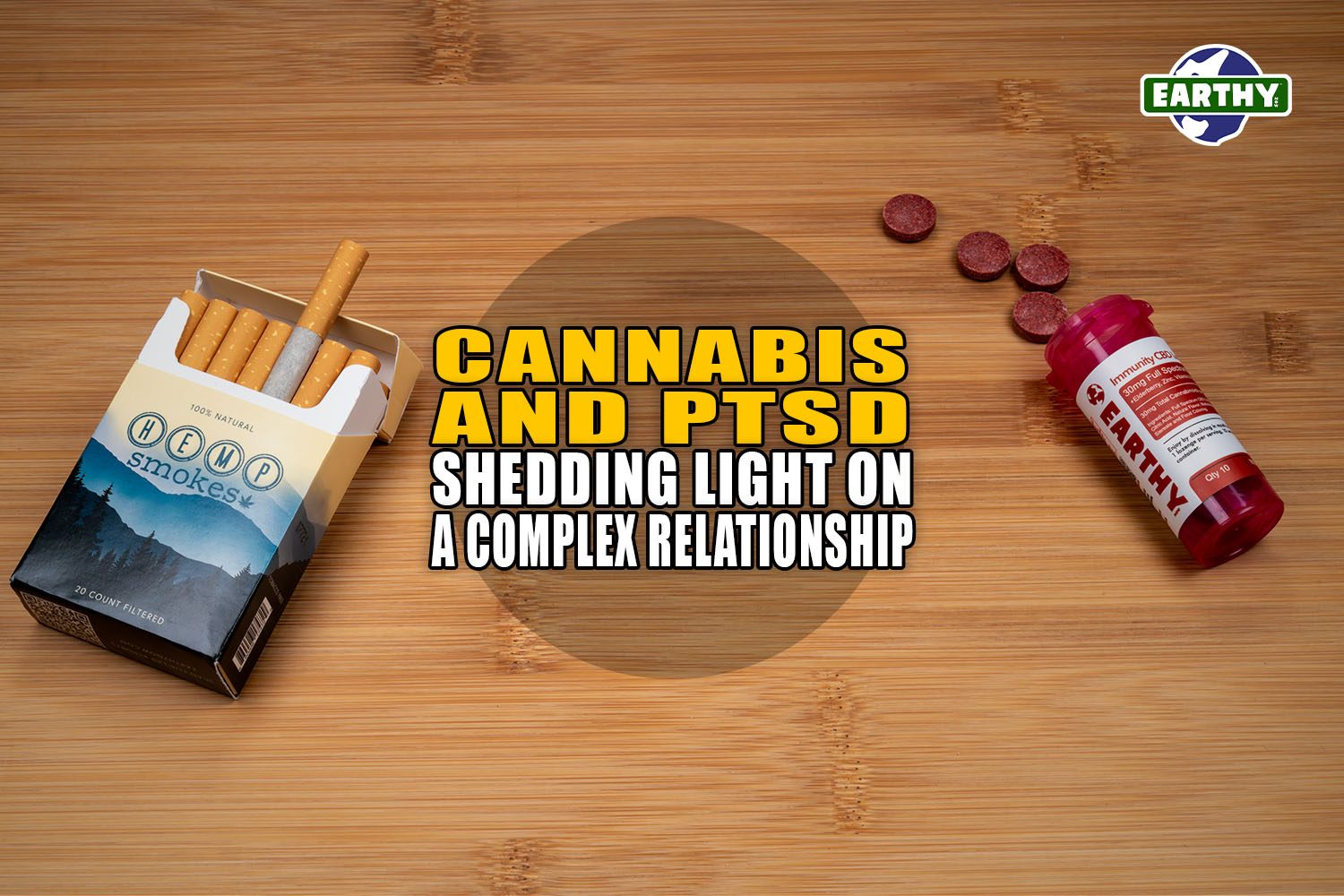Posttraumatic Stress Disorder (PTSD) is a debilitating mental health condition that affects millions of individuals worldwide. Characterized by a range of symptoms, including intrusive thoughts, hyperarousal, and emotional numbing, PTSD can significantly impair daily functioning and quality of life [1]. While evidence-based treatments exist, such as cognitive-behavioral therapy and pharmacological interventions, many patients continue to struggle with persistent symptoms [2]. In recent years, there has been growing interest in the potential wellness effects of cannabis for affecting PTSD symptoms. This article explores the complex relationship between cannabis and PTSD, drawing upon clinical and neurobiological evidence that fuels the debate.
Understanding PTSD
PTSD, as defined by the American Psychiatric Association’s (APA) Diagnostic and Statistical Manual of Mental Disorders (DSM-5), commonly occurs following exposure to a traumatic event. For example, post-traumatic stress symptoms can include re-experiencing the trauma through flashbacks or nightmares or avoiding reminders of the event. Additionally, symptoms can include negative changes in mood and cognition and increased arousal and reactivity. PTSD can develop in anyone who has experienced or witnessed a traumatic event, including military veterans, survivors of abuse or violence, and individuals involved in accidents or natural disasters [1].
Current approaches to treating PTSD
PTSD is typically addressed through a multifaceted treatment approach that combines psychological interventions, pharmacological treatments, and supportive care. The APA recommends evidence-based treatments such as cognitive-behavioral therapy (CBT), eye movement desensitization and reprocessing (EMDR), and pharmacotherapy [1].
Psychological treatment
Psychological treatments, such as CBT and EMDR, aim to help patients process traumatic memories, challenge negative beliefs, and develop coping skills to manage PTSD symptoms. CBT involves cognitive restructuring and exposure therapy, where patients gradually confront and process their traumatic experiences in a safe and supportive environment. EMDR utilizes bilateral stimulation, such as eye movements or tactile sensations, to facilitate reprocessing traumatic memories and reduce their emotional intensity [3].
Pharmacological treatments
Pharmacotherapy may be recommended for patients with PTSD who do not respond adequately to psychological treatments alone or who experience severe symptoms. Antidepressant medications, particularly selective serotonin reuptake inhibitors (SSRIs) and serotonin-norepinephrine reuptake inhibitors (SNRIs), are commonly prescribed to reduce PTSD symptoms such as intrusive thoughts, hyperarousal, and mood disturbances. Other medications, such as prazosin, may be used to alleviate nightmares and sleep disturbances [4].
The Role of Cannabis in Modern Medicine
Integration of medical cannabis treatment
In recent years, there has been growing interest in the potential therapeutic effects of medical cannabis for treating PTSD symptoms. Health research suggests that cannabinoids, the chemical compounds found in cannabis, interact with the body’s endocannabinoid system to modulate overall stress type responses [5]. However, outcomes regarding cannabis use in relation to PTSD are inconclusive. Even so, some PTSD sufferers have reported using medical cannabis to help alleviate symptoms such as anxiety, especially at lower doses [6]. Yet, cannabis affects individuals differently. Thus, it’s imperative to follow a doctor’s prescribed treatment for PTSD.
Does Cannabis Affect Depression? Exploring Cannabis and Mental Health
Considerations for medical cannabis use
While medical cannabis may hold promise for helping various issues, patients and healthcare providers must carefully consider its potential risks and benefits. Some argue that chronic cannabis use may lead to substance use disorder or addiction. Additionally, the psychoactive effects of smoked cannabis may potentially exacerbate dissociative symptoms and mood disorders in some individuals [7]. Thus, patients need to undergo thorough assessments and receive informed guidance from healthcare professionals when considering medical cannabis for any ailment, including PTSD.
By continuing to explore alternative and adjunctive treatment options, healthcare providers can better support patients suffering from the debilitating effects of PTSD and promote their journey toward healing and relief.
The potential of medical cannabis
Cannabis has been used for wellness purposes for centuries [8]. Notably, the cannabis plant contains numerous chemical compounds known as cannabinoids, which interact with the body’s endocannabinoid system. This system seems to be key in regulating various physiological processes, including mood, memory, and stress response. Notably, cannabinoids such as THC (tetrahydrocannabinol) and CBD (cannabidiol) have garnered attention for their potential wellness effects, such as relaxation and enhanced mood. The conversation surrounding cannabis and PTSD symptoms continues to evolve, bringing hope to many [9].
However, the FDA has only approved cannabinoids in pharmacological treatments for a small handful of diseases thus far. For example, the seizure medication Epidiolex comes from CBD. Additionally, Marinol, and Syndros contain dronabinol (synthetic THC), and Cesamet contains nabilone (a synthetic substance similar to THC). These latter medications are approved by prescription to treat nausea and vomiting caused by cancer chemotherapy [10].
Cannabis in Aging: Potential Benefits for Seniors
Exploring the relationship between cannabis and PTSD
Research and clinical trials show cannabis may offer wellness benefits for many individuals, potentially including PTSD patients. For example, a systematic review published in the Journal of Psychoactive Drugs examined the existing literature on cannabis and PTSD and found that, though more research is necessary, cannabis shows promise in its relationship with PTSD symptoms [11]. Additionally, clinical trials show promise regarding cannabis’ ability to affect mood and well-being. This may mean that cannabis may affect symptom severity among users with various psychological experiences [12]. However, these studies are still ongoing, and the debate continues. Those suffering from PTSD should not take cannabis unless advised by a doctor.
Sex and the Endocannabinoid System: Chemistry in the Bedroom
Challenges and controversies
Despite the potential benefits, there are several challenges and controversies surrounding the application of cannabis in PTSD treatment. For example, some individuals have raised concerns about the risk of cannabis dependence, as well as potential adverse effects such as cognitive impairment and acute cannabis intoxication [13]. Additionally, the legal status of cannabis varies widely between jurisdictions, complicating access to medical cannabis for PTSD patients [14]. Lastly, ethical considerations, including informed consent and patient safety, warrant careful attention in clinical settings. Therefore, those with PTSD must consult a doctor and follow a prescribed treatment plan.
Which States Are Leading Cannabis Prison Reform
Future directions and clinical implications
Moving forward, further research is needed to fully understand the therapeutic potential of cannabis for treating PTSD. For instance, researchers need to conduct more randomized controlled trials to establish the efficacy and safety of medical cannabis treatments, particularly in diverse patient populations such as military veterans and individuals with mental health conditions. Integrating endocannabinoid signaling into existing PTSD treatment approaches, such as cognitive-behavioral treatment, could potentially offer new avenues for symptom management and improved treatment outcomes in the future [15]. However, the treatment of posttraumatic stress is nuanced and multifaceted, requiring the help of medical and psychiatric experts.
How Does Cannabis Consumption Affect Your Brain and Cognitive Functions?
Earthy Now’s wellness-boosting hemp products
These premium hemp-derived products provide the industry’s cleanest and strongest CBD, CBN, CBG, CBC, CBDv, and CBDA products, with only trace amounts of Delta-9 THC (no more than 0.3%). As always, Earthy Now provides the perfect balance while ensuring low THC levels per federal guidelines. Customers report various effects, from clear-headed alertness and energy to relaxation.
Earthy Now offers a full line of CBD, CBN, and CBG products, including:
How Much Cannabis Will Increase Libido?
Potential benefits and risks of cannabis use
While some individuals may perceive cannabis as a potential buffer against the blues, it’s essential to consider both the potential benefits and risks. For example, medical cannabis, prescribed by healthcare professionals, has shown promise in alleviating symptoms of various concerns in some patients. However, recreational cannabis use, particularly at high doses and among vulnerable populations such as young people, may pose risks to mental health, especially in those predisposed to them [16].
Heavy or long-term cannabis use has been linked to cannabis use disorder, sleep problems, and difficulties in executive function. All of these potential effects could further exacerbate pre-existing mental health problems [16]. Thus, those in populations vulnerable to mental health disorders, including PTSD, should exercise caution and consult their healthcare provider for guidance.
Menopause, Cannabis, and Sex Drive
Conclusion
In conclusion, the relationship between cannabis and PTSD is complex and multifaceted. While preliminary evidence suggests that cannabis may promote relaxation and calm [12], more research is needed to elucidate the mechanisms of action and identify optimal treatment strategies for PTSD. Clinicians and researchers must weigh the potential therapeutic effects of cannabis against the risks of misuse and adverse effects, taking into account individual patient characteristics and preferences. By continuing to explore the potential of cannabis-based treatments for PTSD, we may uncover new avenues for improving the lives of individuals suffering from this debilitating mental health condition.
Visit Earthy Now for safe, beautiful hemp flower and premium CBD products!
The Difference Between CBD, CBG, and CBN: Exploring Cannabinoids for Wellness
Medical Disclaimer / Legal Disclaimer – Information is provided for educational purposes. It does not and is not intended to constitute legal advice or medical advice. We attempt to be accurate and up-to-date, but the legality of cannabinoids and the science of cannabis are evolving. The author is neither a legal professional nor a medical expert. Before buying or using any products, you should check with your local authorities and medical providers.
References
- What is PTSD?
- Treatments for PTSD
- Eye Movement Desensitization and Reprocessing (EMDR) for PTSD
- Medications for PTSD
- Cannabis in the Management of PTSD: A Systematic Review
- Anxiety and Cannabis Review
- Depersonalization From Marijuana
- History of Medical Cannabis
- A Simple Guide to the Endocannabinoid System
- FDA-Approved Cannabis Medications
- Does Cannabis Use Modify the Effect of Post-Traumatic Stress Disorder?
- Cannabis as a Mood Booster
- Cannabis and Cognitive Functioning: From Acute to Residual Effects, From Randomized Controlled Trials to Prospective Designs
- Legality of Cannabis by US Jurisdiction
- Cannabis: A Potential Efficacious Intervention for PTSD or Simply Snake Oil?
- The Association between Adolescent Cannabis Use and Anxiety: A Parallel Process Analysis




 Earthy Now
Earthy Now Earthy Now
Earthy Now